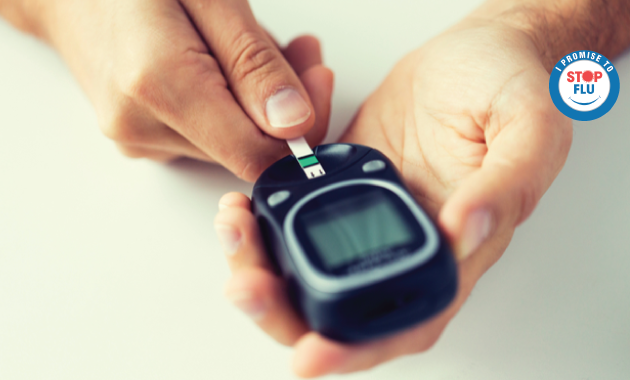
“It was a bright Tuesday morning in the month of June. When I got up and was getting ready for office, I felt a bit unwell. I thought it could be due to blood glucose level, so checked my blood glucose level at home with glucose monitor. And only after I felt the readings were not to worry about, I took my daily dose of medicine, had breakfast and left for office. It was not until I reached back home, that I found myself bit feverish, dizzy and weak. I remember the fatigue as being unbearable. My body temperature shot up, and without a second thought, I consulted a doctor. It was after a series of tests that I got to know I was suffering from the flu. And as I am a diabetic, my doctor advised me to get hospitalized immediately to prevent any complications,” reveals 45-year-old Neeraj Singh.
India is known as the diabetes capital of the world as it is home to approximately 74 million diabetics[1], of the total 425 million in the world. But thanks to increased awareness about diabetes and its health complications, people are now better equipped to manage their condition. Be it a strict diet control and leading an active life, to regular intake of medications and annual health check-ups, no stone is left unturned to keep diabetes under check. But one key point that is not much talked about is the significant impact of flu on diabetics. Though anyone can catch this unpleasant infection, people with diabetes have a harder time fighting it off. In this article, we will be shedding light on how dangerous is flu for diabetics and how to lower the risk of falling prey to flu.
How Flu Affects Diabetics?
Seasonal influenza is most commonly caused by influenza A or B viruses. The condition can cause severe health complications in people with low immunity and chronic health problems such as diabetes. When you suffer from the flu, the body gets stressed both physically and mentally. This causes the body to release certain hormones to fight the infection. However, these hormones can, in turn, cause your blood glucose level to fluctuate thus affecting the action of insulin on the body. This is not good for diabetic patients.
Moreover, flu also weakens the immune system thereby increasing the risk of other infections. Also, when you are sick, you do not feel like eating anything which can affect your blood glucose level. Not taking your medications on time and as advised by your doctor when sick can further worsen diabetes and put you at risk of complications.
How Vaccination Can Help Diabetics?
The World Health Organization (WHO) recommends annual influenza vaccination for people with diabetes to lower the risk of health complications caused by flu[2]. Also, the infection in diabetics can increase the risk of morbidity (diseases such as heart problems and respiratory tract infections) and mortality (death) in diabetics.
According to a 1997 study[3], influenza vaccination caused a reduction of around 79% hospital admissions in people with type 2 diabetes. Another study published in the year 2006 revealed that influenza vaccination in both adults and elderly population caused a reduction of 56% in flu-related health complications, a 54% reduction in hospitalization and a 58% reduction in deaths[4]. A large fraction of people having diabetes are oblivious of the additional risks that flu infection poses, while others are complacent because they regard themselves to be generally healthy.
As diabetics are at a high risk of health complications caused by the flu, getting a flu shot becomes necessary. To ensure the best possible protection, you need to get an annual flu shot. This is because the viruses keep mutating which causes seasonal vaccines to be changed annually to fight the viral particles circulating in the body[5]. Hence, an annual flu shot can help prevent dangerous health complications in people with diabetes.
Ask your doctor to know more about influenza vaccination today!
References:
1. Tripathy JP. Burden and risk factors of diabetes and hyperglycemia in India: findings from the Global Burden of Disease Study 2016. Diabetes Metab Syndr Obes. 2018 Jul 31;11:381-387. Available from: https://www.ncbi.nlm.nih.gov/pmc/articles/PMC6074770/
2. Goeijenbier M, van Sloten TT, Slobbe L, et al. Benefits of flu vaccination for persons with diabetes mellitus: A review. Vaccine. 2017 Sep 12;35(38):5095-5101. Available from: https://www.ncbi.nlm.nih.gov/pubmed/28807608
3. Colquhoun AJ, Nicholson KG, Botha JL, Raymond NT. Effectiveness of influenza vaccine in reducing hospital admissions in people with diabetes. Epidemiol Infect. 1997 Dec;119(3):335-41. Available from: https://www.ncbi.nlm.nih.gov/pmc/articles/PMC2809006/pdf/9440437.pdf
4. Looijmans-Van den Akker I, Verheij TJ, et al. Clinical effectiveness of first and repeat influenza vaccination in adult and elderly diabetic patients. Diabetes Care. 2006 Aug;29(8):1771-6. Available from: https://care.diabetesjournals.org/content/29/8/1771
5. Cold Versus Flu. Symptoms & Diagnosis. Seasonal Influenza (Flu). Centers For Disease Control and Prevention (CDC). Available on: https://www.cdc.gov/flu/symptoms/coldflu.htm
SPIN.IFLU.19.07.0130a/07.19
Disclaimer: The views expressed in this article are independent and unbiased views solely of the publisher. This is a part of the public awareness initiative on influenza supported by Sanofi Pasteur India. Sanofi Pasteur bears no responsibility for the content of this article. One should consult their healthcare provider for any health-related information.
Updated Date: Sep 20, 2019 12:50:25 IST